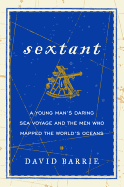
Almost entirely outmoded because of the ease of GPS tracking and usually relegated to the maritime swap meet, the sextant was once a critical tool for sailors to pinpoint their location at sea. With it, they could measure the angle between two visible objects and then calculate their own position in relation to them on a nautical chart. Here sailor David Barrie brings us the history of the sextant, the men who used it and what it helped humankind accomplish.
The adventures of sailors like James Cook, Robert FitzRoy and Joshua Slocum provide a backdrop for Barrie to discuss the development of the sextant, whose origin came by way of navigational principles developed by Sir Isaac Newton and the resulting instrument--the octant. Admiral John Campbell found the octant insufficient; making alterations to it, he invented the sextant in 1757.
Barrie not only documents the stories of these men, he recounts his own transatlantic journeys using a sextant. "The practice of celestial navigation extends our skills and deepens our relationship with the universe around us. What could be more wonderful than to join the long line of those who have found their way across the seas by the light of the sun, moon and stars?"
Even for armchair adventurers with no sea legs to speak of, Barrie's Sextant is a compelling read, ensuring that at least the memory of this significant navigational tool is not lost to antiquity. --Jonathan Shipley, freelance writer

